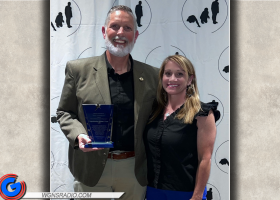The effort to reduce prescription drug-related problems in Tennessee received a boost March 22 when the Food and Drug Administration announced it was expanding its boxed warning, commonly referred to as a "Black Box Warning," to include certain immediate-release pain medicines. The announcement comes after the Tennessee Neonatal Abstinence Working Group petitioned the FDA for the expansion in February, 2016.
Tennessee's Neonatal Abstinence Syndrome Working Group, seeking to impact the prescribing of opioids during pregnancy and to reduce the number of babies born dependent on drugs their mothers were provided, successfully petitioned the FDA in 2012 for an earlier boxed warning. The resulting boxed warning from that petition affected only long-acting opioids. The addition of immediate-release opioids this year strengthens ongoing efforts in Tennessee to prevent the myriad health and economic issues associated with prescription drug abuse.
"We appreciate the FDA's response to pleas from Tennessee and many other states about the need for additional messaging to help reduce the national epidemic of prescription drug abuse and misuse," said TDH Commissioner John Dreyzehner, MD, MPH. "We are especially pleased with the impact this warning can have on reducing the number of babies born dependent on drugs. Since the majority of opioid prescriptions are immediate-release, adding these to the existing black box structure for extended-release opioids will help mothers and their newborns have a healthier start."
"The additional black box warning will bring much-needed support to our efforts across Tennessee to reduce opioid abuse," said Tennessee Department of Mental Health and Substance Abuse Services Commissioner E. Doug Varney. "Combined with the Controlled Substance Monitoring Database now in place to assist clinicians with prescribing and dispensing decisions, we have more effective tools to help prevent homes, families and communities from being negatively affected by powerful narcotics."
In 2012, the Tennessee General Assembly passed legislation signed into law by Governor Bill Haslam requiring clinicians to use the state's Controlled Substance Monitoring Database, or CSMD, before prescribing certain medications. Previously, use of the database was entirely voluntary.
"Mandatory usage of the CSMD has produced several significant effects on prescription drug indicators we review," Dreyzehner said. "We've seen a 23.7 percent reduction in extended-release morphine equivalents dispensed between 2012 and 2015 and a 9 percent reduction in immediate release morphine equivalents for that same time period. We now have 42,835 healthcare registrants using the system and we've learned more healthcare providers are relying on it when making treatment decisions. In fact, a 2015 survey revealed seven out of 10 clinicians had changed a treatment plan after reviewing a CSMD report."
TDH and TDMHSAS encourage anyone with a prescription drug abuse issue to seek help from their healthcare provider.
"Substance use disorder is a disease, not a moral failing," Dreyzehner said. "Even people who don't intentionally misuse these powerful drugs can develop a disease of addiction. If you or someone you care for is in need of substance use treatment, call the TN Redline any time at 1-800-889-9789 for immediate help. Resources are available across the state."
"Help is available, treatment works and people recover," Varney said. "Please help spread the word."
The Neonatal Abstinence Working Group include seven departments and divisions of state government, including Health, Mental Health and Substance Abuse Services, Human Services, Children's Services, Safety and Homeland Security, the Division of Health Care Finance and Administration and the Children's Cabinet, along with a mix of public and private-sector stakeholders.












